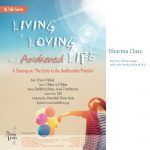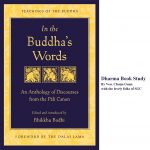大乘百法明門論
Treatise on the Hundred Dharmas
Come join us @ The Buddhist Library
Every Wednesday 7.30pm to 9.30pm

Bite-sized Dharma on the go!
大乘百法明門論
Treatise on the Hundred Dharmas
Come join us @ The Buddhist Library
Every Wednesday 7.30pm to 9.30pm

Living a Loving and Awakened Life 入菩薩行論
Class #9 for in 2017

大乘百法明門論
Treatise on the Hundred Dharmas
Come join us @ The Buddhist Library
Every Wednesday 7.30pm to 9.30pm

The chinese phrase “自由自在” is often translated as being carefree as is something that both young and old look forward to. Children may look forward to be free of their parents, to be free to do as they wish, while after growing up, adults hope to be free of bills and taxes. Older folks want to be free of their ill health while younger ones hope to be free of the stress of work.
Separately, “自由” means “freedom”. It is the catch phrase of modern society. To be free to say as we want, do as we please. In a way, it seems like if we are free to do all that, then we would be “自在”, that is “at ease”. So people spend time, effort and resources to have more freedom, more external freedom, so that we can be at ease.
Enlightened ones, instead, achieves “自在” at ease, through cultivation and removal of defilements. And in this way, they then have true freedom 自由 in their mind. They are free of emotional baggages, free of suffering, free to truly love and care for others without any problem.
For enlightened ones, whether or not they have external freedom or not, they can still be at ease. Whereas, most people depend on external freedom to be at ease. In the end, we do not have the real freedom. The freedom to be happy or not. The moment someone say something to annoy us, we lose our internal emotional freedom.
There is nothing wrong with external freedom. It is good to have external freedom. But if we chase after the external freedom and forget about our internal freedom, in our mind, then we are truly not free at all. We are under the ‘control’ of others. Our emotions are still under the remote control of others.
Some of the practices in Buddhism points to this but on the surface, it may not be apparent.
One example is meditation. When we meditate, we may have heard of how we are not to move, even in the face of aching back and painful legs. Why are we not free to move?
In fact, there is nothing wrong with moving. We meditate not to become a statue or wooden block.
When we experience physical discomfort during meditation, we can move (though some lineages indeed advocates absolutely non-movement). The question is whether we have that choice to move or not, or we have no choice but to move.
If we can learn to face the discomfort and examine the nature of it, then we can understand how it arises and how it ceases. We can transcend the pain and not simply have to move. Transcending the pain, the pain may go away or it may arise or become even stronger. And if there is a need, we can make a conscious mindful decision to move and not simply act on reflex.
We are not giving up our freedom to move. In fact, in this way, we have true freedom to move. Only when we learn to move or not to move, to regain back this decision, and not simply act on reflex, can we be said to have true freedom.
If we cannot even overcome a little bit of physical discomfort, then how are we able to not respond in reflex or spite to verbal or emotional abuse?
A common misconception is that we should hence never respond. We should just bear with everything in silence. This is again, contrary to what the Buddha taught. When faced with dispraise or praise, one should not simply respond with anger or joy, but should listen carefully and respond accordingly whether it is true or false. [1]
If we can do as said earlier instead, then when we are faced with real-life challenges, we can have the ability to not simply jump or strike back, but have the freedom to decide on the best course of response. Then we can do as the Buddha has taught, to respond accordingly.
So my friend, are you free?
[1] DN 1 – Brahmajāla Sutta: The All-embracing Net of Views
http://www.accesstoinsight.org/tipitaka/dn/dn.01.0.bodh.html
In the Buddha’s Words
Bringer of Light, pg 85 – pg 87
No class for 14 and 21 March 2017

Living a Loving and Awakened Life 入菩薩行論
Class #8 for in 2017
